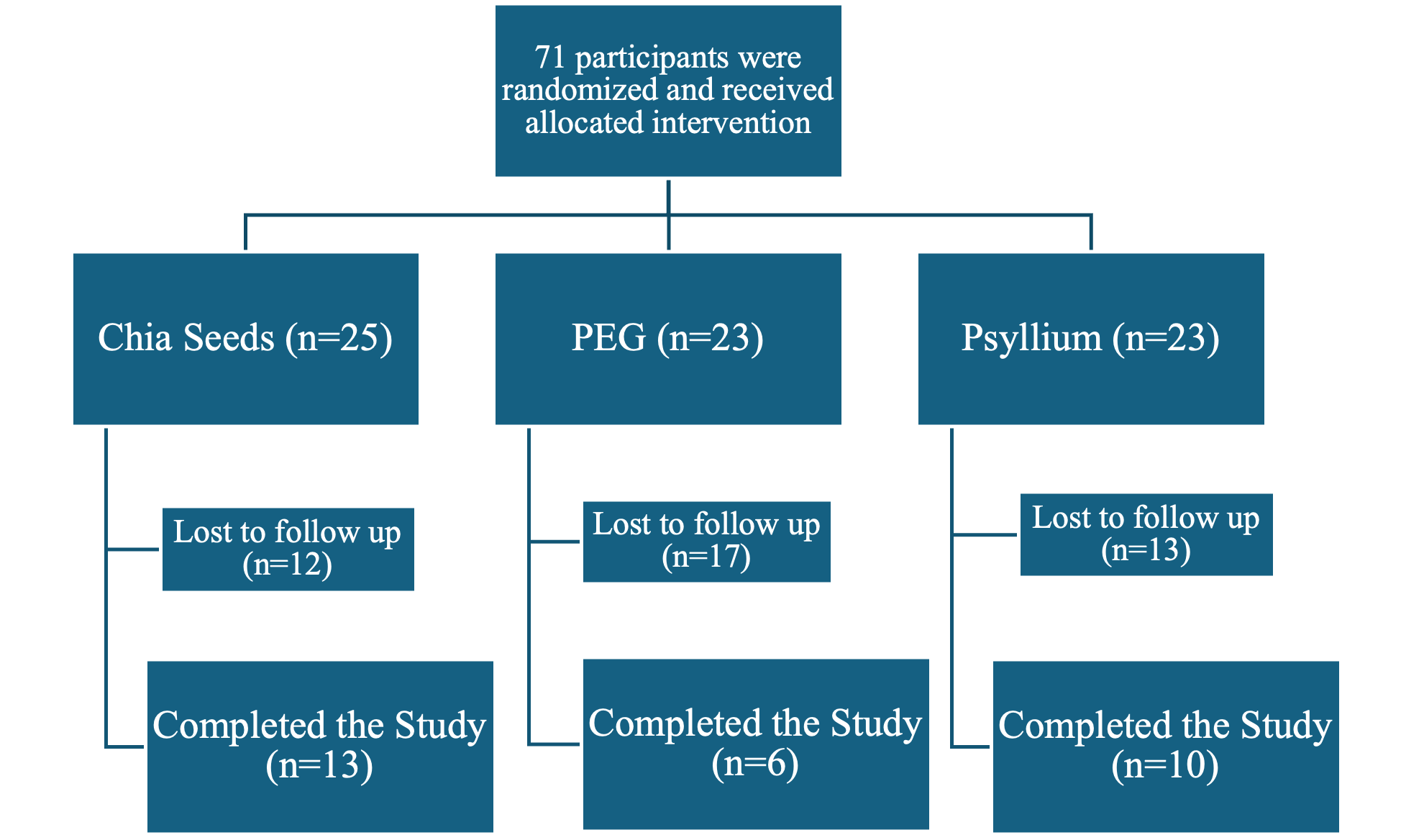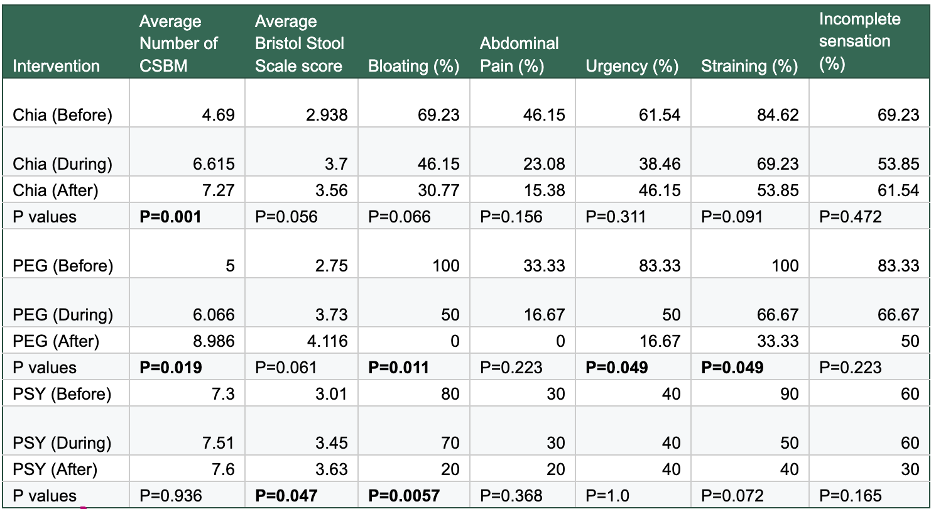Tuesday Poster Session
Category: Functional Bowel Disease
P5084 - Chia Seeds for the Treatment of Chronic Constipation in Adults: A Randomized Multi-Armed Prospective Trial
Tuesday, October 28, 2025
10:30 AM - 4:00 PM PDT
Location: Exhibit Hall

Elona Poltiyelova, DO
Westchester Medical Center
Valhalla, NY
Presenting Author(s)
Award: ACG Presidential Poster Award
Elona Poltiyelova, DO, Gemma Morano, , Isabella Hanesworth, , Sarah Rahni, DO, MBA, Katia Vernord, MD, Shayna Weinstein, , Jonathan Wong, , Se Hyuk Park, MS, Summer Nolan, , Shireen Pais, MD
Westchester Medical Center, Valhalla, NY
Introduction: Chronic constipation (CC) affects up to 14% of the US population. Patients prefer natural therapies however evidence of their effectiveness is limited. Chia seeds anecdotally are reported to alleviate CC, yet research evaluating their efficacy is limited. This randomized prospective trial compared chia seeds, psyllium, and polyethylene glycol (PEG) in increasing complete spontaneous bowel movements (CSBM) per week in CC patients.
Methods: We conducted a randomized prospective trial involving symptomatic adults who met Rome IV criteria for CC from December 2024 through May 2025. Exclusion criteria included opioid use, a history of abdominal surgery, and significant comorbidities. After a 2-week baseline tracking of CSBM, diet, and symptoms, participants were randomized to chia seeds (2 tbsp/day), psyllium (12 g/day), or PEG (17 g/day) for 4 weeks. The open-label study recorded CSBM, stool consistency, and symptoms during treatment and the 2-week post-treatment phase. Analyses included ANOVA, paired t-tests, and Cochran’s Q test.
Results: 71 participants were randomized, 29 completed the study (Chia seeds N=13, PEG N=6, and psyllium N=10). Chia seeds significantly increased the number of CSBM (p=0.001), without other symptom changes (Figure 1). PEG increased the average number of CSBM (p=0.019), improved bloating (p=0.011), urgency (p=0.049), and straining (p=0.049). Psyllium did not significantly affect bowel movement frequency (p=0.937), but improved stool consistency (p=0.047) and bloating (p=0.006). Neither intervention showed superiority for the measured metrics.
Discussion: This is the first clinical trial to compare a standard 28-day serving of chia seeds with psyllium and PEG for chronic constipation. Our results show that chia seeds are non-inferior to these established treatments. Dietary modification remains a cornerstone of constipation management, with increased fiber intake as the primary recommendation, complemented by adequate hydration and physical activity. Chia seeds offer an effective natural fiber source that is low in sugar and high in protein, potentially improving patient adherence compared to higher-sugar alternatives like prunes and kiwifruit. These findings position chia seeds as a promising and well-tolerated treatment option; however, larger double-blind studies are warranted to confirm their efficacy and long-term benefits.

Figure: Figure 1: Effect of chia seeds, PEG, and psyllium on primary and secondary outcomes

Figure: Figure 2: Prospective study design.
Disclosures:
Elona Poltiyelova indicated no relevant financial relationships.
Gemma Morano indicated no relevant financial relationships.
Isabella Hanesworth indicated no relevant financial relationships.
Sarah Rahni indicated no relevant financial relationships.
Katia Vernord indicated no relevant financial relationships.
Shayna Weinstein indicated no relevant financial relationships.
Jonathan Wong indicated no relevant financial relationships.
Se Hyuk Park indicated no relevant financial relationships.
Summer Nolan indicated no relevant financial relationships.
Shireen Pais indicated no relevant financial relationships.
Elona Poltiyelova, DO, Gemma Morano, , Isabella Hanesworth, , Sarah Rahni, DO, MBA, Katia Vernord, MD, Shayna Weinstein, , Jonathan Wong, , Se Hyuk Park, MS, Summer Nolan, , Shireen Pais, MD. P5084 - Chia Seeds for the Treatment of Chronic Constipation in Adults: A Randomized Multi-Armed Prospective Trial, ACG 2025 Annual Scientific Meeting Abstracts. Phoenix, AZ: American College of Gastroenterology.
Elona Poltiyelova, DO, Gemma Morano, , Isabella Hanesworth, , Sarah Rahni, DO, MBA, Katia Vernord, MD, Shayna Weinstein, , Jonathan Wong, , Se Hyuk Park, MS, Summer Nolan, , Shireen Pais, MD
Westchester Medical Center, Valhalla, NY
Introduction: Chronic constipation (CC) affects up to 14% of the US population. Patients prefer natural therapies however evidence of their effectiveness is limited. Chia seeds anecdotally are reported to alleviate CC, yet research evaluating their efficacy is limited. This randomized prospective trial compared chia seeds, psyllium, and polyethylene glycol (PEG) in increasing complete spontaneous bowel movements (CSBM) per week in CC patients.
Methods: We conducted a randomized prospective trial involving symptomatic adults who met Rome IV criteria for CC from December 2024 through May 2025. Exclusion criteria included opioid use, a history of abdominal surgery, and significant comorbidities. After a 2-week baseline tracking of CSBM, diet, and symptoms, participants were randomized to chia seeds (2 tbsp/day), psyllium (12 g/day), or PEG (17 g/day) for 4 weeks. The open-label study recorded CSBM, stool consistency, and symptoms during treatment and the 2-week post-treatment phase. Analyses included ANOVA, paired t-tests, and Cochran’s Q test.
Results: 71 participants were randomized, 29 completed the study (Chia seeds N=13, PEG N=6, and psyllium N=10). Chia seeds significantly increased the number of CSBM (p=0.001), without other symptom changes (Figure 1). PEG increased the average number of CSBM (p=0.019), improved bloating (p=0.011), urgency (p=0.049), and straining (p=0.049). Psyllium did not significantly affect bowel movement frequency (p=0.937), but improved stool consistency (p=0.047) and bloating (p=0.006). Neither intervention showed superiority for the measured metrics.
Discussion: This is the first clinical trial to compare a standard 28-day serving of chia seeds with psyllium and PEG for chronic constipation. Our results show that chia seeds are non-inferior to these established treatments. Dietary modification remains a cornerstone of constipation management, with increased fiber intake as the primary recommendation, complemented by adequate hydration and physical activity. Chia seeds offer an effective natural fiber source that is low in sugar and high in protein, potentially improving patient adherence compared to higher-sugar alternatives like prunes and kiwifruit. These findings position chia seeds as a promising and well-tolerated treatment option; however, larger double-blind studies are warranted to confirm their efficacy and long-term benefits.

Figure: Figure 1: Effect of chia seeds, PEG, and psyllium on primary and secondary outcomes

Figure: Figure 2: Prospective study design.
Disclosures:
Elona Poltiyelova indicated no relevant financial relationships.
Gemma Morano indicated no relevant financial relationships.
Isabella Hanesworth indicated no relevant financial relationships.
Sarah Rahni indicated no relevant financial relationships.
Katia Vernord indicated no relevant financial relationships.
Shayna Weinstein indicated no relevant financial relationships.
Jonathan Wong indicated no relevant financial relationships.
Se Hyuk Park indicated no relevant financial relationships.
Summer Nolan indicated no relevant financial relationships.
Shireen Pais indicated no relevant financial relationships.
Elona Poltiyelova, DO, Gemma Morano, , Isabella Hanesworth, , Sarah Rahni, DO, MBA, Katia Vernord, MD, Shayna Weinstein, , Jonathan Wong, , Se Hyuk Park, MS, Summer Nolan, , Shireen Pais, MD. P5084 - Chia Seeds for the Treatment of Chronic Constipation in Adults: A Randomized Multi-Armed Prospective Trial, ACG 2025 Annual Scientific Meeting Abstracts. Phoenix, AZ: American College of Gastroenterology.


